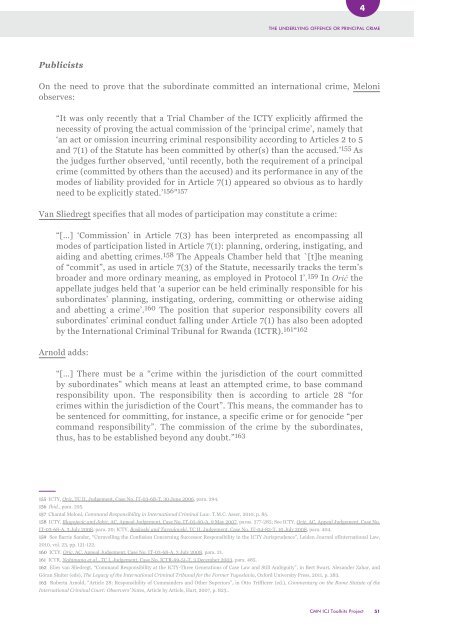Command Responsibility
CMN_ICL_Guidelines_Command_Responsibility_En
CMN_ICL_Guidelines_Command_Responsibility_En
Create successful ePaper yourself
Turn your PDF publications into a flip-book with our unique Google optimized e-Paper software.
4<br />
THE UNDERLYING OFFENCE OR PRINCIPAL CRIME<br />
Publicists<br />
On the need to prove that the subordinate committed an international crime, Meloni<br />
observes:<br />
“It was only recently that a Trial Chamber of the ICTY explicitly affirmed the<br />
necessity of proving the actual commission of the ‘principal crime’, namely that<br />
‘an act or omission incurring criminal responsibility according to Articles 2 to 5<br />
and 7(1) of the Statute has been committed by other(s) than the accused.’ 155 As<br />
the judges further observed, ‘until recently, both the requirement of a principal<br />
crime (committed by others than the accused) and its performance in any of the<br />
modes of liability provided for in Article 7(1) appeared so obvious as to hardly<br />
need to be explicitly stated.’ 156 ” 157<br />
Van Sliedregt specifies that all modes of participation may constitute a crime:<br />
“[…] ‘Commission’ in Article 7(3) has been interpreted as encompassing all<br />
modes of participation listed in Article 7(1): planning, ordering, instigating, and<br />
aiding and abetting crimes. 158 The Appeals Chamber held that `[t]he meaning<br />
of “commit”, as used in article 7(3) of the Statute, necessarily tracks the term’s<br />
broader and more ordinary meaning, as employed in Protocol I’. 159 In Orić the<br />
appellate judges held that ‘a superior can be held criminally responsible for his<br />
subordinates’ planning, instigating, ordering, committing or otherwise aiding<br />
and abetting a crime’. 160 The position that superior responsibility covers all<br />
subordinates’ criminal conduct falling under Article 7(1) has also been adopted<br />
by the International Criminal Tribunal for Rwanda (ICTR). 161 ” 162<br />
Arnold adds:<br />
“[…] There must be a “crime within the jurisdiction of the court committed<br />
by subordinates” which means at least an attempted crime, to base command<br />
responsibility upon. The responsibility then is according to article 28 “for<br />
crimes within the jurisdiction of the Court”. This means, the commander has to<br />
be sentenced for committing, for instance, a specific crime or for genocide “per<br />
command responsibility”. The commission of the crime by the subordinates,<br />
thus, has to be established beyond any doubt.” 163<br />
155 ICTY, Oric, TC II, Judgement, Case No. IT-03-68-T, 30 June 2006, para. 294.<br />
156 Ibid., para. 295.<br />
157 Chantal Meloni, <strong>Command</strong> <strong>Responsibility</strong> in International Criminal Law. T.M.C. Asser, 2010, p. 85.<br />
158 ICTY, Blagojevic and Jokic, AC, Appeal Judgement, Case No. IT-02-60-A, 9 May 2007, paras. 277-285; See ICTY, Oric, AC, Appeal Judgement, Case No.<br />
IT-03-68-A, 3 July 2008, para. 20; ICTY, Boskoski and Tarculovski, TC II, Judgement, Case No. IT-04-82-T, 10 July 2008, para. 404.<br />
159 See Barrie Sander, “Unravelling the Confusion Concerning Successor <strong>Responsibility</strong> in the ICTY Jurisprudence”, Leiden Journal ofInternational Law,<br />
2010, vol. 23, pp. 121-122.<br />
160 ICTY, Oric, AC, Appeal Judgement, Case No. IT-03-68-A, 3 July 2008, para. 21.<br />
161 ICTR, Nahimana et al., TC I, Judgement, Case No. ICTR-99-51-T, 3 December 2003, para. 485.<br />
162 Elies van Sliedregt, “<strong>Command</strong> <strong>Responsibility</strong> at the ICTY-Three Generations of Case Law and Still Ambiguity”, in Bert Swart, Alexander Zahar, and<br />
Göran Sluiter (eds), The Legacy of the International Criminal Tribunal for the Former Yugoslavia, Oxford University Press, 2011, p. 383.<br />
163 Roberta Arnold, “Article 28: <strong>Responsibility</strong> of <strong>Command</strong>ers and Other Superiors”, in Otto Triffterer (ed.), Commentary on the Rome Statute of the<br />
International Criminal Court: Observers’ Notes, Article by Article, Hart, 2007, p. 823..<br />
CMN ICJ Toolkits Project<br />
51


